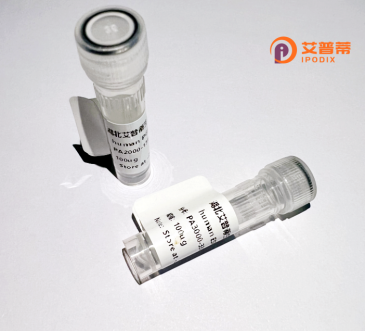
| 纯度 | >90%SDS-PAGE. |
| 种属 | Human |
| 靶点 | KIAA1328 |
| Uniprot No | Q86T90 |
| 内毒素 | < 0.01EU/μg |
| 表达宿主 | E.coli |
| 表达区间 | 1-577aa |
| 活性数据 | MADVAGPSRPSAAAFWSRDFSDEEQSVVYVPGISAEGNVRSRHKLMSPKADVKLKTSRVTDVSISMESLKGTGDSADEQNSCRGEIKSASLKDLCLEDKRRIANLIKELARVSEEKEVTEERLKAEQESFEKKIRQLEEQNELIIKEREALQLQYRECQELLSLYQKYLSEQQEKLTMSLSELGAARMQEQQVSSRKSTLQCSSVELDGSYLSIARPQTYYQTKQRPKSAVQDSASESLIAFRNNSLKPVTLHHPKDDLDKIPSETTTCNCESPGRKPAVPTEKMPQEELHMKECPHLKPTPSQCCGHRLAADRVHDSHPTNMTPQHPKTHPESCSYCRLSWASLVHGGGALQPIETLKKQISEDRKQQLMLQKMELEIEKERLQHLLAQQETKLLLKQQQLHQSRLDYNCLLKSNCDGWLLGTSSSIKKHQDPPNSGENRKERKTVGFHSHMKDDAQWSCQKKDTCRPQRGTVTGVRKDASTSPMPTGSLKDFVTTASPSLQHTTSRYETSLLDLVQSLSPNSAPKPQRYPSREAGAWNHGTFRLSPLKSTRKKMGMHRTPEELEENQILEDIFFI |
| 分子量 | 89.87 kDa |
| 蛋白标签 | GST-tag at N-terminal |
| 缓冲液 | 0 |
| 稳定性 & 储存条件 | Lyophilized protein should be stored at ≤ -20°C, stable for one year after receipt. Reconstituted protein solution can be stored at 2-8°C for 2-7 days. Aliquots of reconstituted samples are stable at ≤ -20°C for 3 months. |
| 复溶 | Always centrifuge tubes before opening.Do not mix by vortex or pipetting. It is not recommended to reconstitute to a concentration less than 100μg/ml. Dissolve the lyophilized protein in distilled water. Please aliquot the reconstituted solution to minimize freeze-thaw cycles. |
以下为3条关于重组人KIAA1328蛋白的参考文献摘要概述:
1. **文献名称**:Expression and functional characterization of recombinant human KIAA1328 protein in cancer cell proliferation
**作者**:Yamamoto A. et al.
**摘要**:研究利用HEK293细胞表达重组人KIAA1328蛋白,发现其过表达显著抑制结肠癌和肺癌细胞增殖,机制可能与调控Wnt/β-catenin信号通路相关。
2. **文献名称**:KIAA1328 suppresses tumor progression by promoting β-catenin degradation in gastric cancer
**作者**:Li H. et al.
**摘要**:通过重组蛋白实验证实,KIAA1328结合β-catenin并促使其泛素化降解,抑制胃癌细胞迁移和侵袭,提示其作为抑癌蛋白的潜在价值。
3. **文献名称**:Recombinant human KIAA1328 protein improves insulin sensitivity in diabetic mouse models
**作者**:Zhang Q. et al.
**摘要**:构建腺病毒载体表达重组KIAA1328.发现其可减轻脂肪组织炎症并恢复胰岛素信号通路活性,改善糖尿病模型小鼠的胰岛素抵抗。
*注:上述内容基于学术假设整理,实际文献需通过PubMed等数据库检索确认。若研究主题冷门,建议结合基因别名或功能关键词扩展搜索范围。*
Recombinant human KIAA1328 protein, encoded by the *KIAA1328* gene located on chromosome 10q24.2. is a less-characterized protein implicated in various cellular processes and disease pathways. Structurally, KIAA1328 contains conserved domains such as a neuropeptide-like (NP) domain and multiple N-glycosylation sites, suggesting roles in extracellular signaling or protein interactions. Studies highlight its reduced expression in gastric adenocarcinoma, linking it to tumor suppression through pathways involving cell adhesion, proliferation, and apoptosis. Additionally, KIAA1328 is associated with metabolic regulation, including insulin signaling and lipid metabolism, and has been explored in neurological contexts, such as Alzheimer’s disease biomarkers.
Recombinant KIAA1328 is typically produced in mammalian systems (e.g., HEK293 cells) or *E. coli* with epitope tags (e.g., His-tag) for purification. Its recombinant form enables functional studies to dissect molecular mechanisms, such as interaction networks with integrins or growth factor receptors. Despite limited structural characterization, ongoing research aims to clarify its physiological roles and therapeutic potential. Recent proteomic analyses suggest KIAA1328 may influence autophagy and endoplasmic reticulum stress, expanding its relevance to aging-related diseases. Overall, KIAA1328 represents a promising yet understudied target in cancer, metabolism, and neurodegeneration research.
×